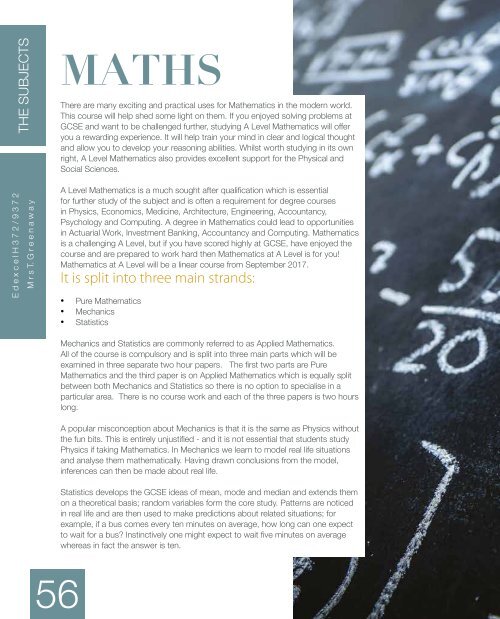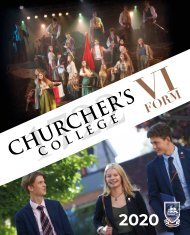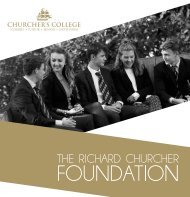Churcher's College Sixth Form Prospectus 2018
Our Sixth Form Prospectus provides course details, an insight into life as a Sixth Former at Churcher's, testimonials from students as well as the universities and types of careers they go on to do in the world of work.
Our Sixth Form Prospectus provides course details, an insight into life as a Sixth Former at Churcher's, testimonials from students as well as the universities and types of careers they go on to do in the world of work.
Create successful ePaper yourself
Turn your PDF publications into a flip-book with our unique Google optimized e-Paper software.
THE SUBJECTS<br />
MATHS<br />
There are many exciting and practical uses for Mathematics in the modern world.<br />
This course will help shed some light on them. If you enjoyed solving problems at<br />
GCSE and want to be challenged further, studying A Level Mathematics will offer<br />
you a rewarding experience. It will help train your mind in clear and logical thought<br />
and allow you to develop your reasoning abilities. Whilst worth studying in its own<br />
right, A Level Mathematics also provides excellent support for the Physical and<br />
Social Sciences.<br />
E d e x c e l H 3 7 2 / 9 3 7 2<br />
M r s T. G r e e n a w a y<br />
A Level Mathematics is a much sought after qualification which is essential<br />
for further study of the subject and is often a requirement for degree courses<br />
in Physics, Economics, Medicine, Architecture, Engineering, Accountancy,<br />
Psychology and Computing. A degree in Mathematics could lead to opportunities<br />
in Actuarial Work, Investment Banking, Accountancy and Computing. Mathematics<br />
is a challenging A Level, but if you have scored highly at GCSE, have enjoyed the<br />
course and are prepared to work hard then Mathematics at A Level is for you!<br />
Mathematics at A Level will be a linear course from September 2017.<br />
It is split into three main strands:<br />
• Pure Mathematics<br />
• Mechanics<br />
• Statistics<br />
Mechanics and Statistics are commonly referred to as Applied Mathematics.<br />
All of the course is compulsory and is split into three main parts which will be<br />
examined in three separate two hour papers. The first two parts are Pure<br />
Mathematics and the third paper is on Applied Mathematics which is equally split<br />
between both Mechanics and Statistics so there is no option to specialise in a<br />
particular area. There is no course work and each of the three papers is two hours<br />
long.<br />
A popular misconception about Mechanics is that it is the same as Physics without<br />
the fun bits. This is entirely unjustified - and it is not essential that students study<br />
Physics if taking Mathematics. In Mechanics we learn to model real life situations<br />
and analyse them mathematically. Having drawn conclusions from the model,<br />
inferences can then be made about real life.<br />
Statistics develops the GCSE ideas of mean, mode and median and extends them<br />
on a theoretical basis; random variables form the core study. Patterns are noticed<br />
in real life and are then used to make predictions about related situations; for<br />
example, if a bus comes every ten minutes on average, how long can one expect<br />
to wait for a bus? Instinctively one might expect to wait five minutes on average<br />
whereas in fact the answer is ten.<br />
56







